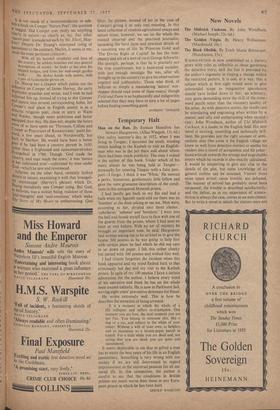Temporary Halt
Man on the Run. By Eustace Hamilton Ian Stewart-Hargreaves. (Allan Wingate, 13s. 6d.) ONE . sultry summer's day in 1952, when I was living in Tangier, I mounted the small, winding streets leading to the Kasbah to visit an English- man who was in the jail there and about whom there had been much publicity. The man I visited is the author of this book. Under which of his many aliases he was being held at Tangier— nominally for entering Tangier with a false pass- port-1 forget. 1 think it was 'White.' He seemed a perky, humorous, gentlemanly little fellow and gave the most gruesome description of the condi- tions in this antiquated Moorish prison.
I had hardly got back to my flat and had a bath when my Spanish maid told me there was an 'hombre' at the door asking to see me. Men were, according to her, divided into three classes : 'caballeros,' sefiores' and 'hombres.' I went into the hall and found myself face to face with one of the guards from the prison, whom I had seen an hour or two before. With an air of mystery he brought an important note, he said. Hargreaves had written asking me to be so kind as to give the bearer 500 pesetas as he was going to help him with certain plans he had which he did not care to set down on paper. I felt this rather cheeky but parted with 100 pesetas and wished him well.
I had almost forgotten the incident when this book appeared and my mind flashed back to that atrociously hot day and my visit to the Kasbah prison. In spite of my 100 pesetas I have a certain admiration for the author. I believe every word of his narrative and think he has on the whole been treated unfairly. He is now in Parkhurst Jail, serving eight years' preventive detention for fraud.
He writes extremely well. This is how he describes the sensation of being arrested :
It is a moment in which the whole of a life collapses and suffers re-orientation. One moment you are free; the next moment you arc not free. You belong to someone else, like a dog or a cat, and subject to the whim of your owner. Without a will of your own, as helpless and as inanimate as a brown-paper parcel in transit. For a little while you are dead and, not caring that you are dead, you are quiet and surrendered.
It seems deplorable to me that so gifted a man has to waste the best years of his life in an English penitentiary. Something is very wrong with our society if we are still determined to regard imprisonment as the universal panacea for all our social ills. In this connection, the author is careful to say that the conditions in British prisons are much worse than those in any Euro- pean prison in which he has been held.
GERALD HAMILTON
































 Previous page
Previous page